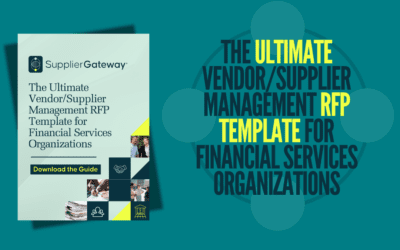In the evolving landscape of procurement, ensuring supplier diversity is not just a compliance requirement but a strategic advantage. A robust self-service diversity vendor verification system is crucial for organizations aiming to streamline their supplier diversity programs. This article outlines the critical requirements necessary for an effective self-service verification of diverse suppliers, helping procurement teams understand the features that facilitate efficient and accurate supplier verification.
Key Requirements/Features for Effective Self Service and Verification of Diverse Suppliers
- Externally Accessible Portal
- Requirement: Must
- Description: A user-friendly portal that allows suppliers to enter general company information and upload necessary documents and certifications is essential. This feature ensures that suppliers can easily provide the information needed for verification, reducing administrative burdens on both sides.
- Customizable Notifications
- Requirement: Must
- Description: Automated notifications to suppliers upon registration submission and approval streamline communication and keep suppliers informed about their status, enhancing transparency and engagement.
- Data Authentication and Validation
- Requirement: Want
- Description: Integrating third-party data authentication processes or validation through certifying organizations ensures the accuracy and legitimacy of supplier information, which is crucial for maintaining a credible supplier diversity program.
- Customizable Information Collection
- Requirement: Must
- Description: The ability to create custom questions and templates for collecting supplier information allows organizations to tailor data collection to their specific needs, ensuring that all relevant information is captured.
- Approval Workflow Capability
- Requirement: Must
- Description: A structured approval workflow ensures that supplier registrations are reviewed and approved systematically, maintaining consistency and compliance with organizational policies.
- Searchable Supplier Database
- Requirement: Must
- Description: Once approved, supplier registrations should be easily searchable by internal users. This feature allows procurement teams to quickly access and evaluate supplier information based on various criteria such as company name, diversity status, and more.
- Communication Capabilities
- Requirement: Want
- Description: The ability to communicate directly with suppliers through the portal facilitates ongoing engagement and support, helping to resolve issues and maintain strong supplier relationships.
- Auto-Notification of Expiring Certificates
- Requirement: Must
- Description: Automated notifications for expiring certificates ensure that suppliers remain compliant and that their diversity status is up-to-date, reducing the risk of lapses in certification.
- Supplier Profile Updates
- Requirement: Must
- Description: Allowing suppliers to update their profiles through the portal ensures that information remains current and accurate, which is vital for effective supplier management.
- Supplier Inactivation
- Requirement: Must
- Description: Portal administrators should have the ability to inactivate suppliers, preventing them from appearing in user searches if they no longer meet the necessary criteria.
- Change Tracking
- Requirement: Must
- Description: Tracking changes to supplier records provides an audit trail that enhances accountability and transparency in supplier management.
- Integration with SAP/Ariba
- Requirement: Must
- Description: Seamless integration with existing systems like SAP or Ariba ensures that supplier data is synchronized across platforms, enhancing efficiency and data accuracy.
- Export and Reporting Capabilities
- Requirement: Must
- Description: The ability to export search results to Excel and generate reports is crucial for data analysis and strategic decision-making.
- Mass Upload and Integration with Advocacy Lists
- Requirement: Must
- Description: Integration with diversity advocacy supplier lists (e.g., NMSDC, WBENC, NGLCC) allows for the mass upload of supplier data, expanding the pool of diverse suppliers and simplifying the verification process.
Conclusion
Incorporating these critical features into your self-service diversity vendor verification system is essential for procurement teams aiming to enhance their supplier diversity programs. By doing so, organizations can ensure compliance with diversity requirements while also leveraging diversity as a strategic asset. A well-designed system not only facilitates efficient verification processes but also empowers organizations to build a more inclusive and competitive supply chain.
To further streamline your Verification of Diverse Suppliers as well as other supplier management processes, consider utilizing our Supplier Lifecycle Management RFP/RFI Template. This expertly crafted tool is designed to guide you through the complex process of evaluating and selecting the best Supplier Lifecycle Management (SLM) software tailored to your organization’s unique needs. In today’s fast-paced business environment, selecting the right SLM software is crucial for maintaining a competitive edge. Unlock the power of efficient supplier lifecycle management and ensure your organization is equipped to thrive in a dynamic market.
Explore the Supplier Lifecycle Management RFP Template and take the first step towards optimizing your supplier diversity and lifecycle management strategies.











